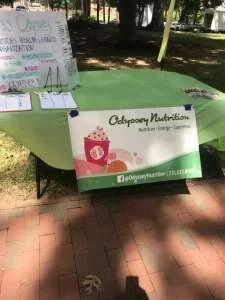Uptown business, student organization involved with suspected pyramid scheme
Two Athens organizations have ties to a large nutrition company previously suspected of operating an illegal pyramid scheme.
Uptown Athens juice bar Odyssey Nutrition. Photo by Ben Peters.
An Ohio University student organization dedicated to student health and an Uptown Athens juice bar are associated with a controversial multi-level marketing company that was previously sued by the federal government.
Odyssey Fitness Group, a campus student organization with 141 members, in 2014 opened Odyssey Nutrition, an Athens smoothie and juice bar with ties to Herbalife — a large nutrition company previously suspected by the Federal Trade Commission of operating an illegal pyramid scheme.
Herbalife operates using a multi-level marketing (MLM) business model, said Stephen Adams, an Ohio U graduate and founder of Odyssey Fitness Group. The company remains active and has affiliates and distributors in over 90 countries and had 8,000 employees around the world in 2016, according to its website.
Odyssey Nutrition is an Herbalife affiliate, which serves as an additional front for Herbalife to sell its weight loss supplements and other products.
Herbalife also trains affiliates, such as Odyssey Nutrition, on how to open and manage a business. Odyssey Nutrition, however, is not allowed to use the words “Herbalife” or “Nutrition Club” in the title of its business, according to Herbalife’s website.
Despite Odyssey Fitness Group’s connection to an Herbalife affiliate, members of the organization are not required to join Herbalife, though many do, Adams said. Odyssey Fitness’s recruitment table at the Ohio U campus involvement fair in late August included pamphlets with information about Herbalife.
Student organizations at Ohio U can not be a front for a business or make individual profits, according to Josh Gruenke, associate director of Student Activities. It’s unclear whether Odyssey Fitness Group is violating university policy.
A pyramid scheme?
The FTC filed a high-profile lawsuit against Herbalife in 2016, alleging that the company was suspected of being a pyramid scheme rather than a MLM.
While MLMs are legal, pyramid schemes are not. In both MLMs and pyramid schemes, employees sell products and make additional income from recruiting others into the company, said Dr. Adam Rapp, executive director of The Ralph and Luci Schey Sales Centre.
In an MLM, an employee can earn income purely through sales, whereas an illegal pyramid scheme is defined by employees who earn income mainly through recruiting other employees, Rapp said.
Herbalife previously rewarded affiliates primarily for recruiting others into Herbalife rather than selling products, according to the FTC.
The FTC also stated that Herbalife’s promotional materials claimed affiliates of the company were able to “quit their jobs, earn thousands of dollars a month and make a career-level income.”
A survey conducted from within Herbalife, however, showed 57% of the nutrition company’s affiliate owners made no profit from the business, according to the FTC. An internal survey also determined that Herbalife affiliates were often used as a way to recruit new members rather than sell products.
A legal settlement was reached between Herbalife and the FTC in late 2016, but the FTC never declared the company an illegal pyramid scheme.
The settlement required Herbalife to pay $200 million in settlements and restructure its business model. The FTC ultimately mailed checks as large as $9,000 to nearly 350,000 people who lost money operating an Herbalife affiliate. The settlement was“one of the largest redress distributions the (FTC) has made in any consumer protection action to date,” according to the FTC.
Following the settlement, the FTC created several new requirements for how MLMs should operate. This included avoiding unsubstantiated earnings claims and ensuring the majority of an employee's income comes from the sale of products rather than the recruitment of more employees.
College students and multi-level marketing
Even with the additional FTC regulations, it can be difficult for MLM participants to make substantial income that many companies promise potential employees. MLMs are usually better for earning additional cash rather than a full-time income, Rapp said.
“It’s kind of the original side hustle,” he said. “It was an opportunity for individuals to make money on the side or on top of their full time jobs. Can you make enough money to support a family? I know people have done it in the past, so I don’t know if it’s viable, but I would argue it’s something you do on the side.”
Rapp also pointed out that the part-time business model of MLMs could be appealing to college students. MLMs may also actively recruit college students because they are often not familiar with traditional business practices and have plenty of free time to sell products between classes, he said.
In the past, Herbalife regularly targeted college-age demographics. The nutrition company is advertised on blogs as an ideal weight loss option for college students. The Fashion Institute of Design & Merchandisings, a fashion college in California, previously offered Herbalife-sponsored classes; Herbalife even offers a $5,000 scholarship to dietetic students.
As MLMs are becoming more prominent on college campuses, students may find themselves drawn to the promise of additional income offered by sales companies such as Herbalife.
Rapp recommends that before starting with any sales company, students should look into how much their initial sale materials cost, how much support the company will give them to build a network, and if they can make income based on sales and not recruitment.
Asking these questions can prevent students from joining predatory pyramid schemes and other illegitimate businesses.
“If something is too good to be true, it probably is,” Rapp said.



